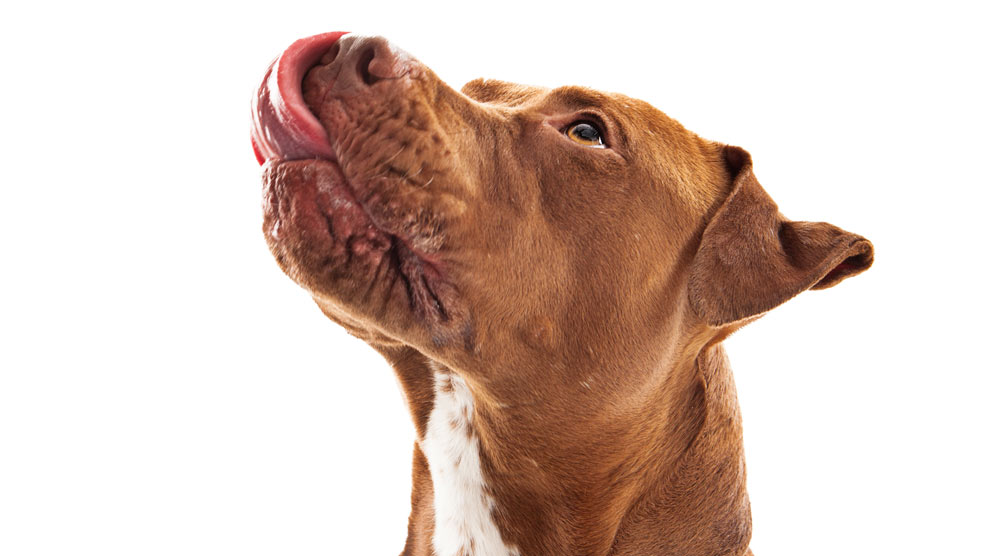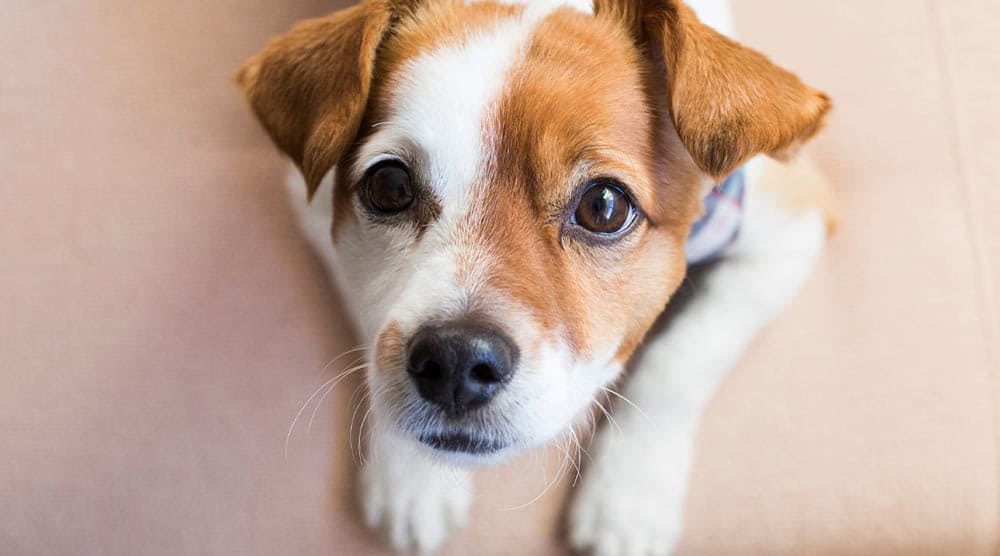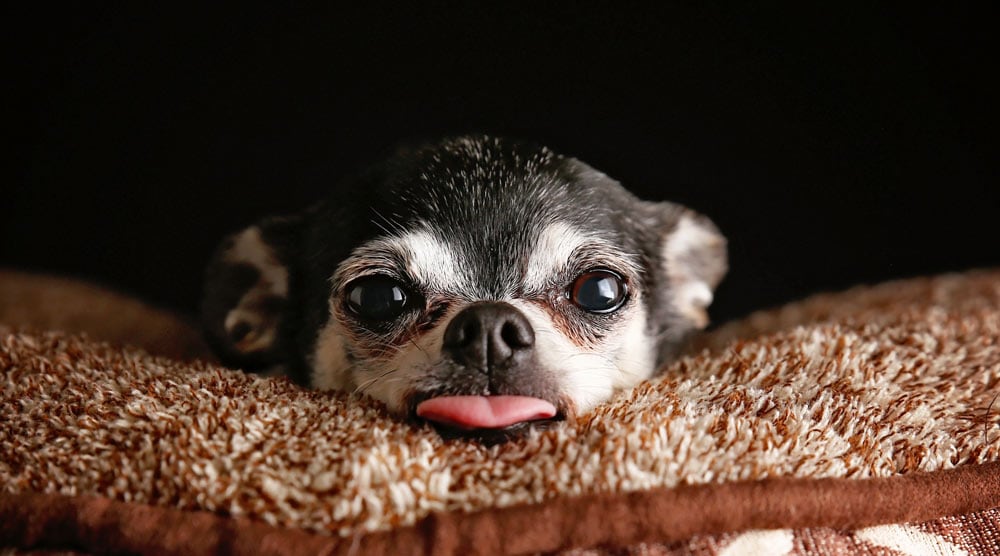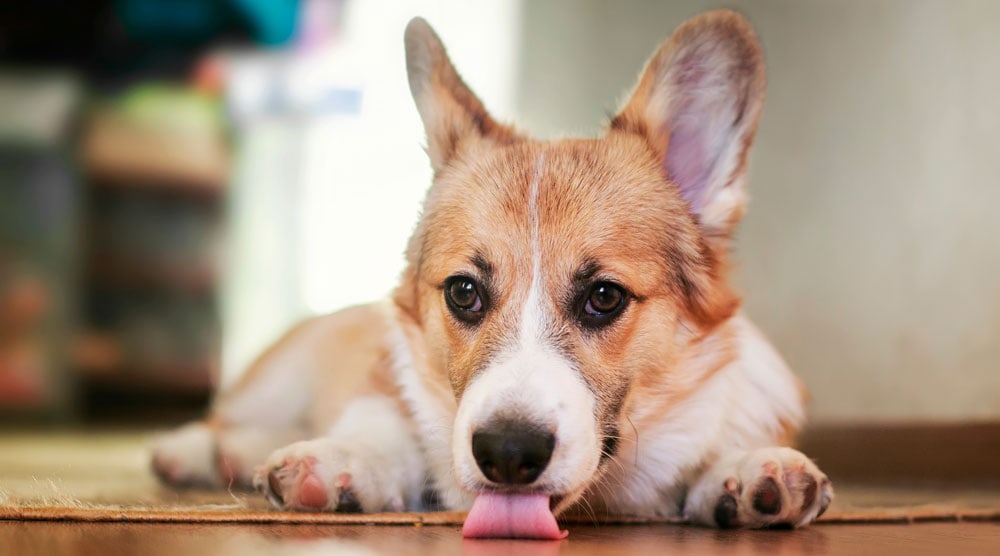Key Takeaways
- There are many potential reasons why a dog might lick the air. Some of these are harmless, but air licking can also be a sign of stress or a medical problem.
- Air licking in dogs can be a reaction to strong emotions, such as overexcitement or overstimulation. It can also indicate stress or anxiety.
- Air licking can sometimes point to health issues like gastrointestinal disorders, dental pain, or neurological conditions. It’s important to observe if the licking is accompanied by symptoms like abdominal pain, vomiting, or oral pain.
- Persistent or obsessive air licking warrants a consultation with a vet or a canine behaviorist, especially if it’s accompanied by distress or other symptoms.
Air licking is a canine behavior with many potential causes. These range from relatively harmless triggers, such as excitement, to neurological conditions and other health problems,
In this article, we’ve collaborated with veterinary surgeon Dr Linda Simon to answer the question, “why does my dog lick the air?” We’ll also discuss when you should worry about this behavior and when to contact a vet or behaviorist.
Contents
6 Reasons Your Dog Licks the Air
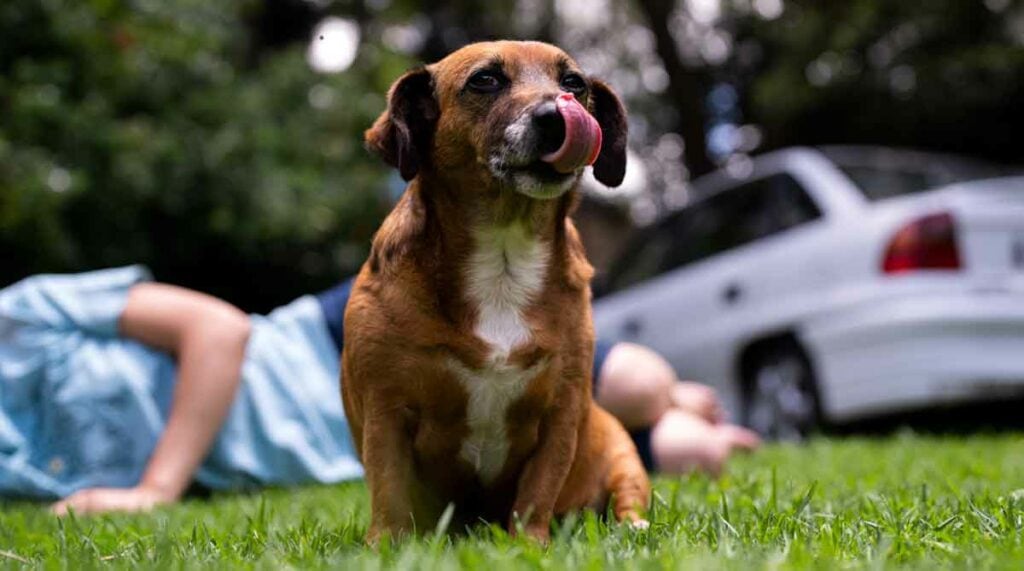
There are several reasons your dog might lick the air. If the behavior is persistent, occurs with other symptoms, or if your dog appears distressed, contact your vet immediately.
It’s also worth noting that “air licking” is different from “lip licking.” The difference isn’t always obvious, but air licking usually involves an extended tongue and looking up into the air.
Excitement
Licking the air is sometimes a way dogs respond to a strong emotion, such as excitement. For example, you might notice your dog air licking when a visitor arrives, when they realize it’s walk time, or when they are being petted.
It’s important to note that this isn’t always positive, as air licking can be a symptom of overexcitement or overstimulation. So, if you think your dog is getting worked up or overstimulated, then it’s important to help them calm down.
Here are some common situations that can cause overexcitement and how to help your dog:
- If your dog gets too excited when they run around on walks, it may help to put them on leash for short periods to let them calm down.
- When playing high-energy games your dog loves, always stop before they become overstimulated.
- Ask guests to speak quietly and calmly when they arrive. It may also help if guests avoid interacting with your dog initially so your pet has time to calm down after the excitement of their arrival.
- If your dog is very excitable when guests arrive, consider keeping them in another room or on the opposite side of a fence until they calm down.
- Avoid putting your dog in situations where they are likely to become overstimulated. This could include situations where there are other dogs if they are reactive.
Tip: If your dog often seems overstimulated or overexcited when you have visitors (or any other situation), then it’s important to contact a canine behaviorist. The sooner you can start to help your dog with these issues, the easier they’ll be to resolve.
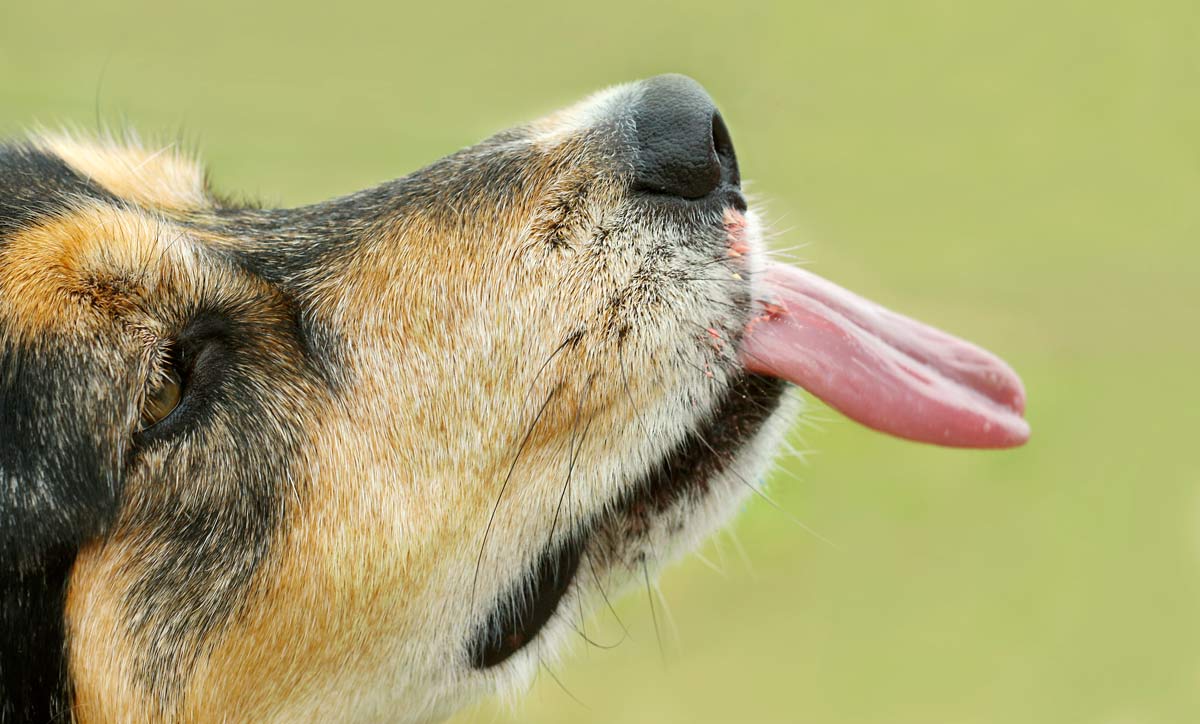
Stress or Anxiety
Licking the air can be a sign that a dog is stressed or anxious. This could either be due to a specific stress trigger, such as thunderstorms or visitors, or caused by generalized anxiety.
Specific Stress Triggers
If the licking is in response to a specific stressful event, you’ll often be able to spot this by looking for triggers whenever the licking occurs.
“I see air licking most commonly in dogs with separation anxiety and noise phobias,” says Dr Linda Simon, a veterinary surgeon. “For these dogs, air licking seems self-soothing, and it can continue for many hours after the stressful event.”
Desensitizing your dog to stress triggers can be a difficult process, so it’s best to work with a canine behaviorist.
In the meantime, try to minimize situations when your dog is exposed to the trigger. If the trigger is unavoidable, do your best to reduce the intensity. For example, playing white noise might help if your dog is scared of thunderstorms.
Generalized Anxiety
If your dog is licking the air in response to chronic or generalized anxiety, then there will often be other signs of stress. These can include:
- Excessive drooling or shedding
- Shaking or trembling
- Excessive or increased vocalization
- Paw sweating
- Lethargy
- Appeasement behaviors, such as a tucked tail or submissive grin
Unfortunately, the cause of generalized anxiety isn’t always easy to diagnose. It can often be health-related, so you should consult with your vet as soon as possible.
In some cases, the use of calming supplements and medication may help. “We recently treated a Border Collie who would constantly air lick, but all tests were coming back normal,” says Dr Simon. “Eventually, a specialist diagnosed her with canine OCD, and her signs were managed with a combination of antidepressant medicine and a training program.”
Tip: Does your dog lick the couch or other objects? Take a look at our guide to why dogs lick the couch and why does lick the floor.
Health Problems
Air licking can be a sign of a medical problem, particularly if it’s excessive or happens more often than normal.
Gastrointestinal (GI) Issues
“The most common medical reasons I encounter for air licking in dogs are nausea and abdominal cramps,” says Dr Linda Simon, veterinary surgeon. “For these dogs, we’ll usually see additional signs such as vomiting, food refusal, and lethargy.”
In fact, as many as 75% of dogs that experience excessive licking (though not necessarily of just the air) have some kind of gastrointestinal disorder, like acid reflux, esophagitis, or pancreatitis. Other signs of a GI problem include abdominal pain, changes in appetite, and digestive issues like vomiting and diarrhea.
It’s important to get a veterinary diagnosis of your dog’s GI issues, as many of these conditions have similar symptoms.
“While acid reflux can occur, it is generally over-diagnosed by owners and is not that common in dogs,” says Dr Simon. “When I do see it, it tends to be in brachycephalic dogs such as Pugs and is often associated with hiatal hernias.”
Oral Health Issues
Oral health issues are another common reason dogs appear to be licking the air.
Licking can be in response to dental pain, a sore in the mouth, or something lodged in the roof of the mouth. It can also be due to something as simple as an object stuck to the tongue, lip, or roof of the mouth, so check their mouth for foreign objects.
Neurological or Cognitive Issues
In rare cases, licking the air can be due to a seizure, neurological condition, or cognitive disorder. It may be accompanied by other symptoms, such as staring into space or behavior changes.
“Air licking would typically be caused by a partial seizure, rather than a full ‘tonic-clonic’ seizure,” says Dr Simon. “These are less easy for owners to recognize, so it’s a good idea to video the event to show your vet.”
Why Does My Dog Lick Their Lips When I Pet Them?
It’s thought that some dogs lick the air when they are content or showing affection. This is similar to when your dog licks you to give a “kiss”, and may indicate that they are enjoying your petting.
However, as we’ve already mentioned, licking the air can also be due to anxiety. If you’re petting your dog in a way that they find stressful, then they might lick the air as a form of self-soothing.
Next time you notice your dog licking the air while being petted, try to judge whether you are crowding your dog, petting them when they want to rest, or otherwise causing stress. Some other indicators that your dog doesn’t want to be petted can include looking away from you, distancing themselves, or giving “whale eye.”
Summary
Air licking is a common canine behavior that can have a variety of causes. These include excitement, stress, and physical health problems.
Contact your vet if your dog’s air licking is excessive or combined with other symptoms. You can help your vet make an accurate diagnosis by keeping a record of when, how long, and under what conditions your dog licks the air.
We hope this article has helped you understand why your dog might lick the air. If you have any questions, please use the comments form below. You may also want to read our guide to why dogs lick their beds.
